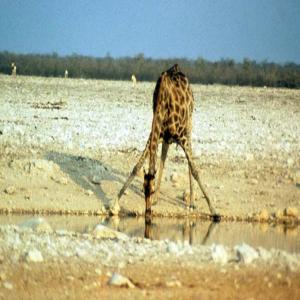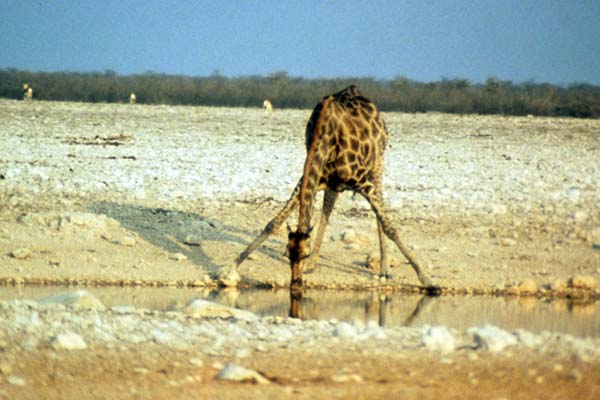Episodes

Monday Dec 20, 2010
The WildLife: Tapirs & Saving Scarlet Macaws, Sharon Matola, Part 2
Monday Dec 20, 2010
Monday Dec 20, 2010
Sharon Matola, founder and director of the Belize Zoo, discusses her work with tapirs and her fight to save Belize’s last scarlet macaws. She tells “The WildLife” host Laurel Neme how her fight to stop the Challilo hydroelectric dam on Belize’s Macal River, which threatened numerous rare species, including the country’s last scarlet macaws, resulted in the government branding her an enemy of the state. This fight was documented in the book “The Last Flight of the Scarlet Macaw: One Woman’s Fight to Save the World’s Most Beautiful Bird” by Bruce Barcott. We also talk about tapirs and learn how one very special one, Tambo, is poised to become a true animal ambassador. This is the second of a two-part interview. Part 1 addresses what makes the Belize Zoo the “best little zoo in the world” and also her work with jaguar rehabilitation.
Sharon Matola is an American-born, motorcycle-riding, lion-taming, monkey-smuggling Air Force veteran who’s fluent in Russian and an expert in jungle survival, mushrooms and tapir biology. In 1983, she started the Belize Zoo as a home for a collection of 17 wild animals used in a documentary film she’d worked on about tropical forests. Today, The Belize Zoo and Tropical Education Center has grown to about 170 animals, including jaguars, tapirs, harpy eagles and macaws. Sharon is best known for is her work rescuing and rehabilitating rare creatures and is often referred to as the Doctor Doolittle of Belize or else the “Jane Goodall of jaguars.” In addition to serving as Director of the Belize Zoo, she hosts a regular radio program on BFBS Radio in Belize and is author of several books, including a series about Hoodwink the Owl for schoolchildren, one about Junior Buddy, one of the zoo’s most famous jaguars, and another called Tambo the Tapir, which is forthcoming. This episode of “The WildLife” aired on The Radiator, WOMM-LP, 105.9 FM in Burlington, Vermont on December 20, 2010.

Monday Nov 08, 2010
Monday Nov 08, 2010
US Fish and Wildlife Service Special Agent Sheila O’Connor reveals what it takes to work in wildlife law enforcement. In the second of a two-part interview, Special Agent O’Connor tells “The WildLife” host Laurel Neme about the specialized training officers go through. (Part I last week focused on her adventures stopping wildlife crime—from tarantulas to tigers.)
Special Agent O’Connor is a veteran wildlife law enforcement officer, with over 20 years of service under belt. She began her career in wildlife law enforcement as a Conservation Police Officer for the Illinois Department of Natural Resources, where she served for eight years. She then moved to federal wildlife law enforcement with the US Fish and Wildlife Service, where she was first posted to Ann Arbor, Michigan, and then to St. Paul, Minnesota. During that time, she investigated several cases that led to felony convictions for violations of wildlife laws. She was recently promoted to be a training officer at the Federal Law Enforcement Training Center (also known as FLETC) in Georgia. This episode of “The WildLife” aired on The Radiator, WOMM-LP, 105.9 FM in Burlington, Vermont on November 8, 2010.

Monday Jun 21, 2010
The WildLife: Brazil's Illegal Bird Trade, Juliana Machado Ferreira
Monday Jun 21, 2010
Monday Jun 21, 2010
Brazilian biologist Juliana Machado Ferreira discusses the illegal wildlife trade in Brazil. She tells “The WildLife” host Laurel Neme about the domestic market for pet birds and what role wildlife forensic research can play in helping to expose and stop this trade. She also discusses her genetic research into the DNA of four songbird species and how knowledge of their geographic origin can help with the rehabilitation and release of illegally captured animals. Juliana Machado Ferreira is a passionate Brazilian biologist who seeks to save the world one bird at a time. She is a TED Senior Fellow and is pursuing her doctorate in Conservation Genetics at the Laboratory of Evolutionary Biology and Vertebrate Conservation (LABEC) at São Paulo University. She also works with SOS Fauna. Her current research project involves developing species-specific molecular markers and population genetics studies of four passerine birds, with the aim to understand the distribution of their genetic variability and to track down the origin of birds seized from illegal trade. She works closely with the US National Fish and Wildlife Forensics Laboratory, and her ultimate goal is to help set up a Wildlife Forensics Laboratory in Brazil.This episode of “The WildLife” aired on The Radiator, WOMM-LP, 105.9 FM in Burlington, Vermont on June 21, 2010.

Monday Mar 08, 2010
The WildLife: Illegal Parrot Trade in Mexico & CITES, Juan Carlos Cantu
Monday Mar 08, 2010
Monday Mar 08, 2010
Juan Carlos Cantu, director of Defenders of Wildlife’s Mexico Office, discusses the illegal parrot trade and the Convention on International Trade in Endangered Species (CITES). He reveals to “The WildLife” host Laurel Neme how his innovative research into the illegal parrot trade was used by the Mexican Congress to reform that country’s Wildlife Law to ban all trade in parrots. He also discusses how CITES works and what controversies to expect for the March 2010 Conference of Parties in Doha, Qatar. Mr. Cantu directs he coordinated the oceans and forestry campaigns for Greenpeace Mexico where he conceived and led the campaign to create the world’s largest national whale sanctuary in all Mexican waters. He also co-founded a Mexican non governmental organization, called Teyeliz, where he wrote many reports on the illegal wildlife trade. He’s also worked for the Sea Turtle Restoration Project to get Mexico to use sea turtle excluder devices, and held several other positions. Since 2002, he’s worked for Defenders of Wildlife on the illegal parrot trade, and his efforts helped the Mexican Congress reform the Wildlife Law to ban all trade of parrots and also helped get many endangered species of parrots, including the yellow-crested cockatoo and the blue-headed macaw, uplisted to Appendix I of CITES. He has also created 5 comic books on the illegal trade of sea turtles and started a radio show called “Supervivencia”, which creates public awareness about wildlife issues and is the highest rated show on the station with over 400,000 listeners. This episode of “The WildLife” aired on The Radiator, WOMM-LP, 105.9 FM in Burlington, Vermont on March 8, 2010. Article and edited transcript available on Mongabay.com.

